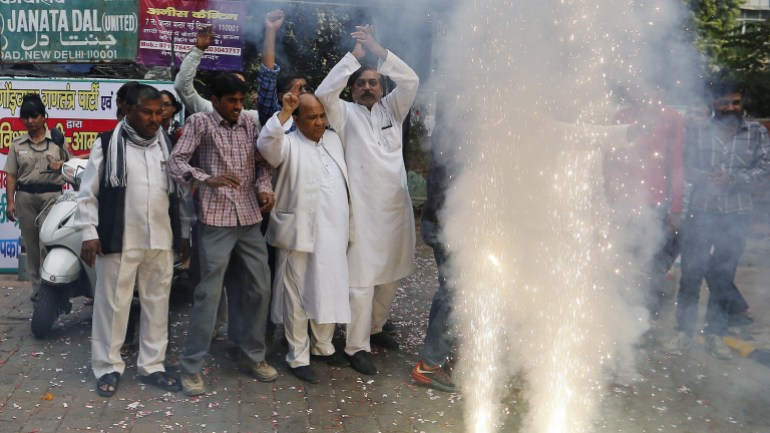India’s ruling BJP, allies win regional polls in a boost to Modi
Prime Minister Modi’s BJP and its ally win 125 seats of Bihar state’s 243-seat legislature, while opposition managed to win 110 seats.

India’s governing party and its allies have won key state election seen as a barometer of Prime Minister Narendra Modi government’s handling of the coronavirus pandemic and the resulting economic downturn.
Modi’s Bharatiya Janata Party (BJP) and his regional ally Janata Dal United (JDU) won 125 seats of Bihar state’s 243-seat legislature, India’s election commission website showed.
Keep reading
list of 4 itemsIndia coronavirus cases cross 8 million amid fears of second wave
Three from India’s governing BJP party killed in Kashmir attack
The army of women saving India’s storks
A coalition of more than three political parties led by Rashtriya Janata Dal (RJD) opposed to the incumbent alliance managed to win 110 seats.
The result, which was announced on early hours of Wednesday, mean that Nitish Kumar from the Janata Dal United (JDU) will likely return as chief minister. He has been in the post since 2005.
Modi on Tuesday thanked people of Bihar for making a “decisive decision” to give development a chance. “I again assure every citizen of Bihar that for the balanced development of every person, every region, we will continue to work with full dedication,” he tweeted.
Bihar in eastern India is its second-most populous state and one of its poorest. Control of the key electoral battleground is seen as a referendum on Modi’s popularity.
The RJD and his allies have accused the state government of tempering with results – a charge denied by the election officials.

His opponents have criticised what they call his government’s inept handling of the pandemic, which has led to more than 127,000 death so far nationwide. Modi’s party and his alliance partner were pitted against the resurgent RJD party, led by a 31-year-old Tejashwi Yadav.
The young leader campaigned in an alliance with the Indian National Congress, the country’s main opposition party and communist parties, which put up an impressive performance winning 16 seats.
The alliance made employment for youth its main election promise in the state where the unemployment rate is nearly double the national average.
From Agiaon in Bhojpur region, @ManojManzil1 of @cpimlliberation has won with 86,327 votes, over61% of total votes. He's known for leading 'sadak pe school' movement. He was arrested soon after he filed his nomination, got bail later. His parents work in brick kiln. #BiharResults
— Anjali Ojha (@ojhaanjali) November 10, 2020
Modi’s party and his allies have focused on nationalistic policies. To win votes, the coalition leaders often evoked the erosion of Muslim-majority Kashmir’s semi-autonomy last summer, the recent placement of a ceremonial cornerstone for a temple in central India on the site of a mosque that was destroyed by Hindu rioters decades ago and the ongoing border clash with China in mountainous Ladakh.
Yadav’s coalition was initially seen as a long-shot effort. But the party drew attention as pollsters predicted a wave of an anti-incumbency against the current government amid a pandemic that has led to at least 1,000 deaths and 220,000 cases of coronavirus in the state so far.
Modi’s second term has been marked by a shrinking economy, widening social strife, numerous protests against discriminatory laws and the government reaction to the pandemic.

India’s tally of confirmed cases – the second-largest in the world behind the United States – stands at more than 8.5 million.
Modi’s overall popularity remains unmatched in India, but his party faced tougher-than-expected challenges in recent state polls.
Over the past two years, Modi’s party has lost six state elections and gained power only in two. Despite the party’s sweeping victory to a second term in May 2019, the BJP suffered a considerable setback when it lost two key coalition partners in northern Punjab and western Maharashtra.
Millions voted in Bihar, where authorities, in an effort to halt people from spreading the virus while they voted, increased the number of polling stations, extended voting time by one hour at most sites and required the sanitisation of electronic voting machines.
Political campaigning was initially replaced with virtual rallies but political parties held rallies that drew tens of thousands of supporters, many of whom did not wear masks.
That raised fears coronavirus cases could jump and strain the state’s critically underfunded and weak healthcare system.
